含有实意动词的一般疑问句和否定句
否定句及一般疑问句
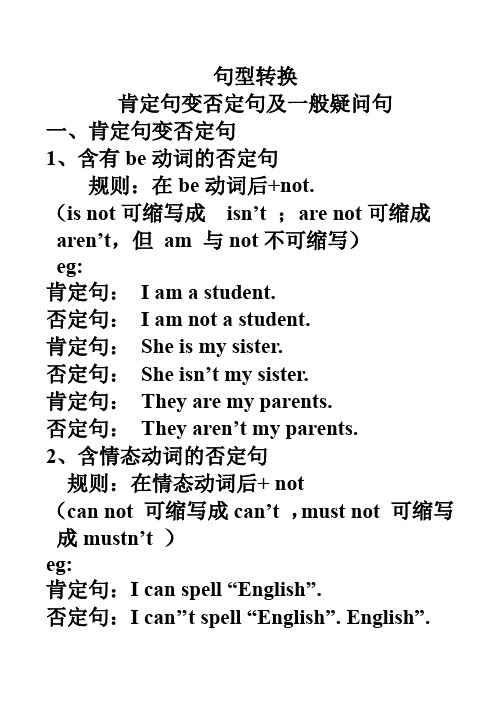
句型转换肯定句变否定句及一般疑问句一、肯定句变否定句1、含有be动词的否定句规则:在be动词后+not.(is not可缩写成isn’t ;are not可缩成aren’t,但am 与not不可缩写)eg:肯定句:I am a student.否定句:I am not a student.肯定句:She is my sister.否定句:She isn’t my sister.肯定句:They are my parents.否定句:They aren’t my parents.2、含情态动词的否定句规则:在情态动词后+ not(can not 可缩写成can’t ,must not 可缩写成mustn’t )eg:肯定句:I can spell “English”.否定句:I can’’t spell “English”.English”.肯定句:I must find it.否定句:I mustn’t find it.3、含有实义动词的句子的否定句构成(1)第三人称单数做主语。
(he、she、it或表示单个人或物的第三人称名词)规则:要在行为动词前加上助动词doesn’t,然后将动词恢复原形。
eg :肯定句:He has a soccer ball.否定句:He doesn’t have a soccer ball.(2)其它人称做主语规则:在行为动词前加don’t ,句子中的行为动词用原形。
eg:肯定句:They like bananas.否定句:They don’t like bananas.注:(1)在变否定句时,如遇some应变any Here are some books.Here aren’t any books.二、肯定句变一般疑问句1、含有be动词的句子变一般疑问句规则:把be动词提至句首,第一人称变第二人称,句末句号变问号。
(I/we变成youMy/our变成your)肯定句:I am a student.一般疑问句:Are you a student?肯定句:She is my sister.一般疑问句:Is she your sister?肯定句:They are my parents.一般疑问句:Are they your parents?2、含有情态动词的句子变一般疑问句规则:把情态动词提至句首,第一人称变第二人称,句末句号变问号。
七上unit5含实义动词的句子怎样变否定句和一般一般疑问句

实义动词一般现在时的句型
句型形式 句型结构
例句
肯定句
主语+实义动词+… He likes English.
否定句
主语+don’t /
He doesn’t like
doesn’t +动词原形 English.
疑 一般疑 Do/Does+主语+ Does he like
问 问句 动词原形+…
English?
含实义动词的句子怎样变为否定句
1. He wants to go to Beijing. He does’ t want to go to Beijing.
2. Peter lives in Chongqing. Peter does’ t live in Chongqing.
3. Lucy knows about China. Lucy does’ t know about China.
5. Jane goes to school by bike. Does Jane go to school by bike? Yes, she does. / No, she doesn’ t.
6. Kangkang helps her study English. Does Kangkang help her study English? Yes, he does. / No, he doesn’ t.
wash---w__a_s_h_e_s fix---___fi_x_e_s__ go---__g_o__e_s__
play---__p_l_a_y_s_
study---_s_t_u_d_ie_ s carry---_c_a_r_r_ie_s
含实义动词的句子怎样变否定句和一般一般疑问句

have want live like does has wants lives likes
don’ t do
don’ t have don’ t want don’ t live don’ t like doesn’ t do doesn’ t have doesn’ t want
doesn’ t live
1. They play games on the playground. Do they play games on the playground? Yes, they do. / No, they don’t. 2. Lucy and Lily speak English. Do Lucy and Lily speak English? Yes, they do. / No, they don’t. 3. My classmates get up at 7:00. Do your classmates get up at 7:00? Yes, they do. / No, they don’t.
doesn’ t like
含实义动词的句子怎样变一般疑问句
do 1.如果句子中的动词 为原形,变一般疑问句时, have 在句首加Do,其余不变。 want 2.如果句子中的动词为第 live 三人称单数形式,变一般 疑问句时,在句首加Does, like 然后把动词变为原形,其 does 余不变。 has 注:some --- any wants I/ we --- you lives my/our --- your
原形 如果句子中_前加______________,其余不变。 don’ t (do not)
含实义动词的句子怎样变为否定句
1. He wants to go to Beijing. He does’ t want to go to Beijing. 2. Peter lives in Chongqing. Peter does’ t live in Chongqing. 3. Lucy knows about China. Lucy does’ t know about China. 4. Her mother works in a school. Her mother does’ t work in a school.
助动词的用法,帮助实义动词构成否定句和疑问句
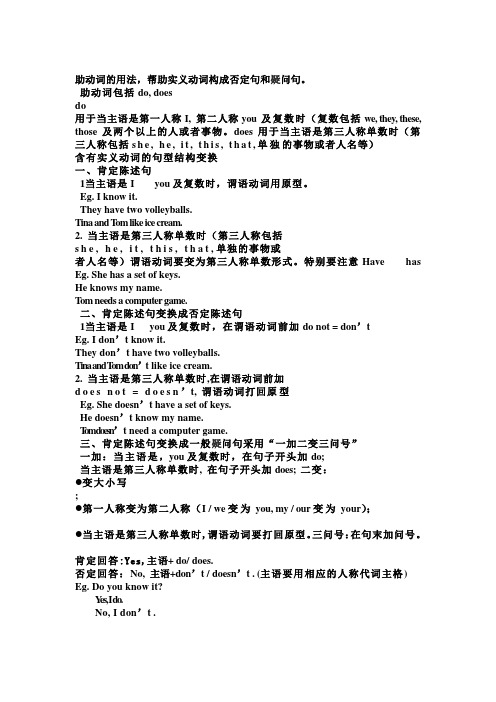
助动词的用法,帮助实义动词构成否定句和疑问句。
助动词包括do, doesdo用于当主语是第一人称I, 第二人称you 及复数时(复数包括we, they, these, those及两个以上的人或者事物。
does 用于当主语是第三人称单数时(第三人称包括s h e,h e,i t,t h i s,t h a t,单独的事物或者人名等)含有实义动词的句型结构变换一、肯定陈述句1当主语是I you及复数时,谓语动词用原型。
Eg. I know it.They have two volleyballs.Tina and T om like ice cream.2. 当主语是第三人称单数时(第三人称包括s h e,h e,i t,t h i s,t h a t,单独的事物或者人名等)谓语动词要变为第三人称单数形式。
特别要注意Have has Eg. She has a set of keys.He knows my name.T om needs a computer game.二、肯定陈述句变换成否定陈述句1当主语是I you及复数时,在谓语动词前加do not = don’tEg. I don’t know it.They don’t have two volleyballs.Tina and T om don’t like ice cream.2. 当主语是第三人称单数时,在谓语动词前加d oe s n o t=d o e s n’t, 谓语动词打回原型Eg. She doesn’t have a set of keys.He doesn’t know my name.T o m d o e s n’t need a computer game.三、肯定陈述句变换成一般疑问句采用“一加二变三问号”一加:当主语是,you及复数时,在句子开头加do;当主语是第三人称单数时, 在句子开头加does; 二变:●变大小写;●第一人称变为第二人称(I / we变为you, my / our变为your);●当主语是第三人称单数时,谓语动词要打回原型。
含实义动词的句子怎样变否定句和一般一般疑问句
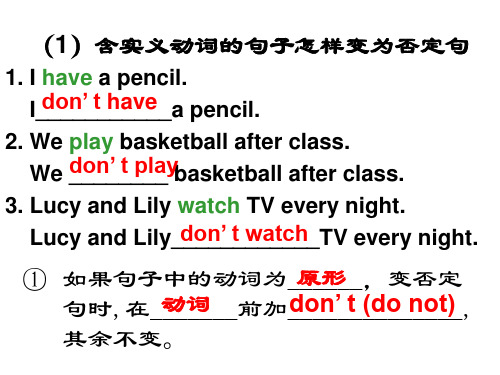
原形 ,变否定 ① 如果句子中的动词为______ don’ t (do not) 动词 前加______________, 句时,在_______ 其余不变。
含实义动词的句子怎样变为否定句
1. He plays soccer every day. doesn’ t play soccer every day. He ___________ 2. Peter likes English. doesn’ t like Peter ______________ English. 3. Her mother works in a school. t workin a school. Her mother doesn’ ___________
• 6. [Do/Does]______ we have a good teacher? Yes, we ____[do/does]. • 7. [Do/Does]_____ they jump rope ? No, they ___[do not/does not]. • 8. [Do/Does]_____your dog walk in the zoo? • 9. [Do/Does]____ I have a big nose? • No, you _____[do not/does not]. • 10. [Do/Does]____ your cats eat fish? Yes, they _____.[do/does].
• 一般疑问句:
Does have • 1._____the desk_____(have)four legs? • Yes,it does. Does do • 2._____she____(do)her homework every day? • Yes,she does. Does live • 3._____he_____(live)in Huanggang? • No,he doesn't. Does need • 4._____he_____(need)a pair of shoes? • NO,he doesn't.
实义动词的否定句和疑问句句式变化及动词的第三人称变化规律
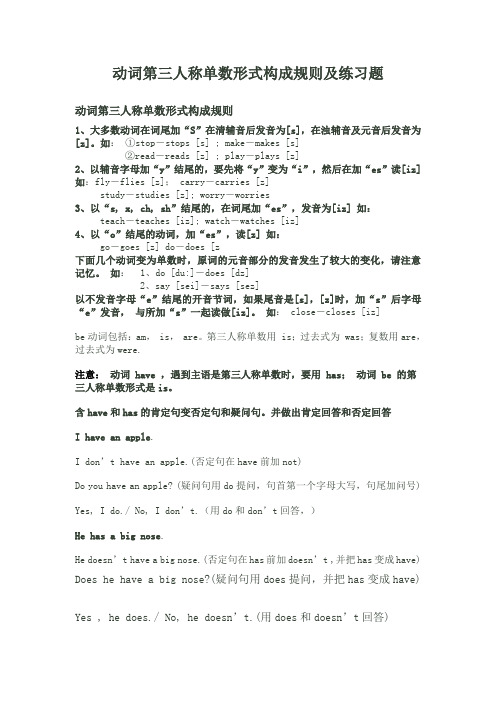
动词第三人称单数形式构成规则及练习题动词第三人称单数形式构成规则1、大多数动词在词尾加“S”在清辅音后发音为[s],在浊辅音及元音后发音为[z]。
如:①stop-stops [s] ; make-makes [s]②read-reads [z] ; play-plays [z]2、以辅音字母加“y”结尾的,要先将“y”变为“i”,然后在加“es”读[iz] 如:fly-flies [z]; carry-carries [z]study-studies [z]; worry-worries3、以“s, x, ch, sh”结尾的,在词尾加“es”,发音为[iz] 如:teach-teaches [iz]; watch-watches [iz]4、以“o”结尾的动词,加“es”,读[z] 如:go-goes [z] do-does [z下面几个动词变为单数时,原词的元音部分的发音发生了较大的变化,请注意记忆。
如: 1、do [du:]-does [dz]2、say [sei]-says [sez]以不发音字母“e”结尾的开音节词,如果尾音是[s],[z]时,加“s”后字母“e”发音,与所加“s”一起读做[iz]。
如: close-closes [iz]be动词包括:am, is, are。
第三人称单数用 is;过去式为 was;复数用are,过去式为were.注意:动词 have ,遇到主语是第三人称单数时,要用 has;动词 be 的第三人称单数形式是is。
含have和has的肯定句变否定句和疑问句。
并做出肯定回答和否定回答I have an apple.I don’t have an apple.(否定句在have前加not)Do you have an apple? (疑问句用do提问,句首第一个字母大写,句尾加问号)Yes, I do./ No, I don’t.(用do和don’t回答,)He has a big nose.He doesn’t have a big nose.(否定句在has前加doesn’t,并把has变成have) Does he have a big nose?(疑问句用does提问,并把has变成have)Yes , he does./ No, he doesn’t.(用does和doesn’t回答)一般现在时中的第三人称单数形式在一般现在时中,当主语是第三人称单数时,谓语动词要用第三人称单数形式,即常在动词原形后加-s或-es。
含实义动词的句子怎样变否定句和一般一般疑问句
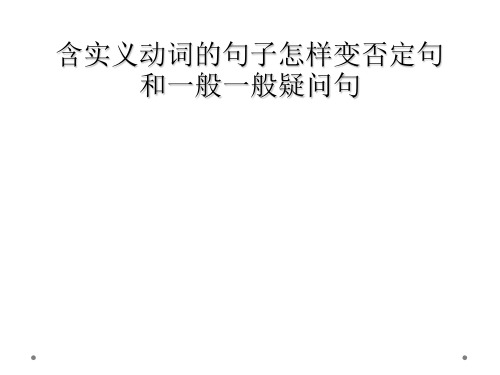
1. 1. They play games on the playground. 2. Do they play games on the playground? 3. Yes, they do. / No, they don’t.
4. 2. Lucy and Lily speak English. 5. Do Lucy and Lily speak English? 6. Yes, they do. / No, they don’t.
doesn’ t do doesn’ t have doesn’ t want doesn’ t live doesn’ t likdo
为原形,变一般疑问句时, have 在句首加Do,其余不变。
want
2.如果句子中的动词为第 三人称单数形式,变一般 live
2.如果句子中的动词为 like 第三人称单数形式,变
否定句时,在动词前加 does
does’ t (does not), has
然后把动词变为原形, wants
其余不变。
lives
注:some --- any
likes
don’ t do don’ t have don’ t want don’ t live don’ t like
如果句子中的动词为_第__三__人__称__单__数__形__式__, 变否定句时,在动__词__前加d_o__e_s_’ _t_(_d_o_e_s__n_o_t,) 然后把动词变为_原__形___,其余不变。
含实义动词的句子怎样变为一般疑问句
1. 1. I want to go to Beijing. 2. Do you want to go to Beijing. 3. 2. We live in Chongqing. 4. Do you live in Chongqing. 5. 3. Lucy and Lily know about China. 6. Do Lucy and Lily know about China. 7. 4. Her parents work in a school. 8. Do her parents work in a school.
实义动词的否定句和疑问句句式变化及动词的第三人称变化规律
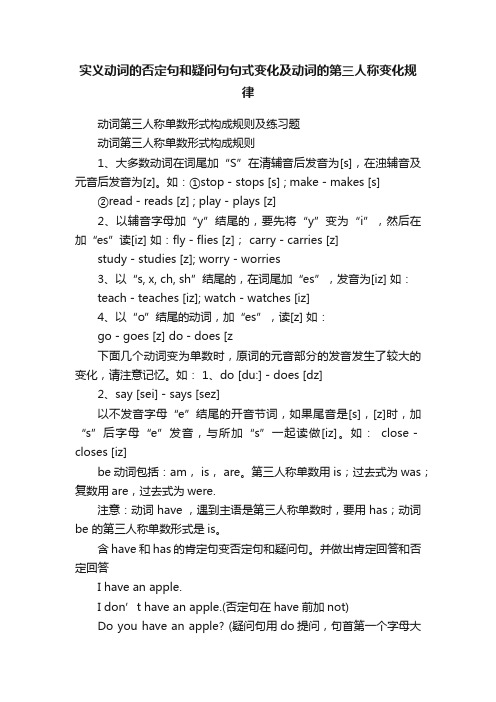
实义动词的否定句和疑问句句式变化及动词的第三人称变化规律动词第三人称单数形式构成规则及练习题动词第三人称单数形式构成规则1、大多数动词在词尾加“S”在清辅音后发音为[s],在浊辅音及元音后发音为[z]。
如:①stop-stops [s] ; make-makes [s]②read-reads [z] ; play-plays [z]2、以辅音字母加“y”结尾的,要先将“y”变为“i”,然后在加“es”读[iz] 如:fly-flies [z]; carry-carries [z]study-studies [z]; worry-worries3、以“s, x, ch, sh”结尾的,在词尾加“es”,发音为[iz] 如:teach-teaches [iz]; watch-watches [iz]4、以“o”结尾的动词,加“es”,读[z] 如:go-goes [z] do-does [z下面几个动词变为单数时,原词的元音部分的发音发生了较大的变化,请注意记忆。
如: 1、do [du:]-does [dz]2、say [sei]-says [sez]以不发音字母“e”结尾的开音节词,如果尾音是[s],[z]时,加“s”后字母“e”发音,与所加“s”一起读做[iz]。
如:close-closes [iz]be动词包括:am, is, are。
第三人称单数用 is;过去式为 was;复数用are,过去式为were.注意:动词 have ,遇到主语是第三人称单数时,要用 has;动词be 的第三人称单数形式是is。
含have和has的肯定句变否定句和疑问句。
并做出肯定回答和否定回答I have an apple.I don’t have an apple.(否定句在have前加not)Do you have an apple? (疑问句用do提问,句首第一个字母大写,句尾加问号)Yes, I do./ No, I don’t.(用do和don’t回答,)He has a big nose.He doesn’t have a big nose.(否定句在has前加doesn’t,并把has变成have) Does he have a big nose?(疑问句用does提问,并把has变成have)Yes , he does./ No, he doesn’t.(用does和doesn’t回答)一般现在时中的第三人称单数形式在一般现在时中,当主语是第三人称单数时,谓语动词要用第三人称单数形式,即常在动词原形后加-s或-es。
小学英语肯定句变否定句和一般疑问句类型(含答案)
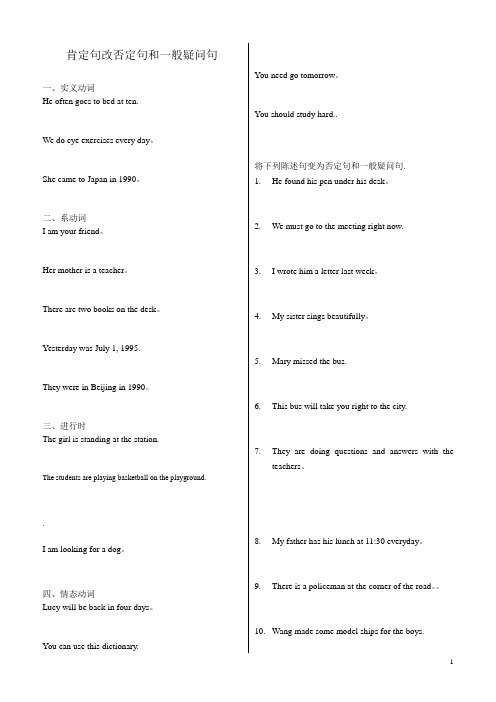
肯定句改否定句和一般疑问句一、实义动词He often goes to bed at ten.We do eye exercises every day。
She came to Japan in 1990。
二、系动词I am your friend。
Her mother is a teacher。
There are two books on the desk。
Yesterday was July 1, 1995.They were in Beijing in 1990。
三、进行时The girl is standing at the station.The students are playing basketball on the playground..I am looking for a dog。
四、情态动词Lucy will be back in four days。
You can use this dictionary. You need go tomorrow。
You should study hard..将下列陈述句变为否定句和一般疑问句.1.He found his pen under his desk。
2.We must go to the meeting right now.3.I wrote him a letter last week。
4.My sister sings beautifully。
5.Mary missed the bus.6.This bus will take you right to the city.7.They are doing questions and answers with theteachers。
8.My father has his lunch at 11:30 everyday。
9.There is a policeman at the corner of the road。
最新七上unit5含实义动词的句子怎样变否定句和一般一般疑问句

go---________ have---_______
用动词的适当形式填空
It _____ (have) two big eyes.
My parents often _______ (watch) TV.
Lily ______(go) to school by bus.
必背:Do或Does要提到句首,之后的动词用原形。
注:some --- any
I/ we --- you
my/our --- your
注意:对于肯否回答,用do或does问,要用do或does回答。
1. They play games on the playground.
Dothey play games on the playground?
Yes, theydo. / No, theydon’t.
2. Lucy and Lily speak English.
DoLucy and Lily speak English?
Yes, theydo. / No, theyபைடு நூலகம்on’t.
3. He walks to school.
Doeshe walk to school?
班级:姓名:
实义动词的一般现在时
一、实义动词概念
表示有实际意义的动词。通常放在主语后,在句中做谓语,所以实义动词也叫谓语动词。eg: eat, drink, have, see
二、实义动词的一般现在时特征
1.经常性、习惯性的动作
I go to school at 7:00 every day.
2.目前的爱好、能力等
4、特殊变化
含实义动词的句子怎样变否定句和一般一般疑问句概要
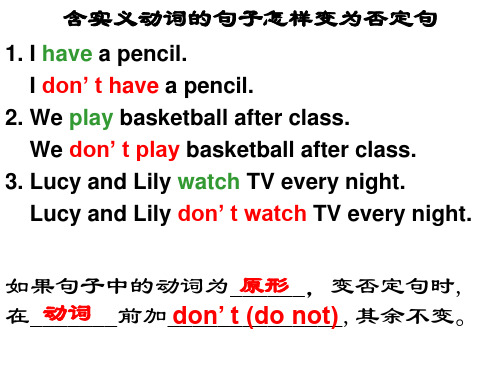
含实义动词的句子怎样变为一般疑问句
1. I have two volleyballs. Do you have two volleyballs?
2. We live in Tongjiang. Do you live in Tongjiang?
3. Lucy and Lily like China. Do Lucy and Lily like China?
如果句子中的动词为_原__形___,变否定句时, 在_动__词____前加_d_o_n__’ _t _(d__o_n__o_t_) ,其余不变。
含实义动词的句子怎样变为否定句
1. He plays soccer every day. He doesn’ t play soccer every day.
3. Lucy likes China. Does Lucy like China?
如果句子中的动词为_第__三__人__称__单__数__形__式__, 变一般疑问句时,在句首D加oe_s______,然后把 动词变原为形______,其余不变。
含实义动词的句子怎样变否定句
1.如果句子中的动词 do
变否定句
1. They play games at home. They don’ t play games at home.
2. My classmates get up at 7:00. My classmates don’ t get up at 7:00.
3. Jane goes to school by bike. Jane doesn’t go to school by bike.
likes
don’ t do don’ t have don’ t play don’ t like
一般疑问句、否定句
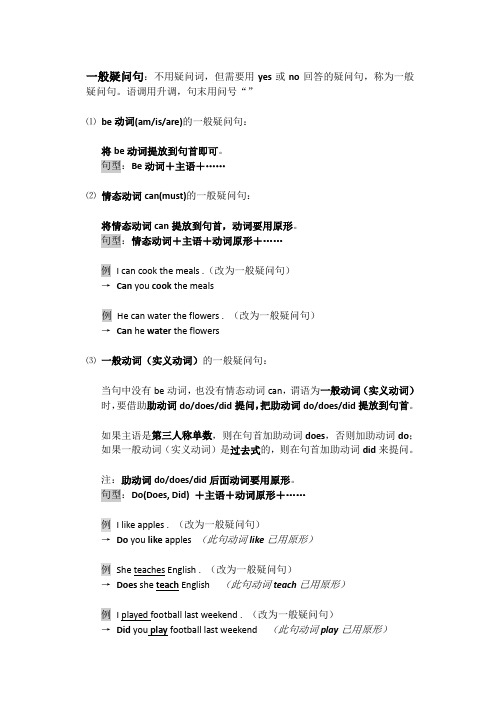
一般疑问句:不用疑问词,但需要用yes或no回答的疑问句,称为一般疑问句。
语调用升调,句末用问号“”⑴be动词(am/is/are)的一般疑问句:将be动词提放到句首即可。
句型:Be动词+主语+……⑵情态动词can(must)的一般疑问句:将情态动词can提放到句首,动词要用原形。
句型:情态动词+主语+动词原形+……例I can cook the meals .(改为一般疑问句)→Can you cook the meals例He can water the flowers . (改为一般疑问句)→Can he water the flowers⑶一般动词(实义动词)的一般疑问句:当句中没有be动词,也没有情态动词can,谓语为一般动词(实义动词)时,要借助助动词do/does/did提问,把助动词do/does/did提放到句首。
如果主语是第三人称单数,则在句首加助动词does,否则加助动词do;如果一般动词(实义动词)是过去式的,则在句首加助动词did来提问。
注:助动词do/does/did后面动词要用原形。
句型:Do(Does, Did) +主语+动词原形+……例I like apples . (改为一般疑问句)→Do you like apples (此句动词like已用原形)例She teaches English . (改为一般疑问句)→Does she teach English (此句动词teach已用原形)例I played football last weekend . (改为一般疑问句)→Did you play football last weekend (此句动词play已用原形)表示否定事实的句子叫做否定句。
be动词、情态动词can(must)、一般动词(实义动词)的否定句:⑴在be动词后面加not句型:主语+be动词+not+……例I am a teacher .(改为否定句)→I am not a teacher .例He is a boy . (改为否定句)→He is not a boy .例They are students . (改为否定句)→They are not students .⑵在情态动词can(must)后面加not句型:主语+情态动词+not+动词原形例I can make the bed . (改为否定句)→I can not make the bed .⑶如果句中没有be动词,也没有情态动词can,只有一般动词(实义动词),则在一般动词(实义动词)前加don’t(doesn’t, didn’t)构成。
一般疑问句的几种类型

一.一般现在时定义:一般现在时表示现在经常或反复发生的动作、存在的状态的时态.用法:1) 经常性或习惯性的动作 ,如:I do my homework in the evening。
We often have lunch at school.I am a student.2)客观真理,客观存在,科学事实。
The earth moves around the sun.地球围绕太阳转。
Shanghai lies in the east of China.上海位于中国东部。
构成:1) 含有be动词的一般现在时的构成肯定句:主语 + be(am, is, are ) + 其他否定句:主语 + be(am, is, are ) +not + 其他疑问句:be(am, is, are ) +主语 + 其他如:We are students。
We are not students.Are we students?2) 含有实义动词的一般现在时的够成肯定句:主语+ 实义动词 + 其他否定句:主语 + don’t/doesn’t +动词原形 + 其他疑问句:Do/Does + 主语 + 动词原形 + 其他如:I go to school in the morning。
We don't go to school on Sunday。
Does she go to work on Sunday?提示词:every morning/night/evening/day/week, Often, sometimes,always, usually, regularly,二.第三人称单数式在一般现在时中,当主语是第三人称单数时,谓语动词需要变化,动词的变化形式就叫做第三人称单数式。
变化规律如下:1. 一般情况下,直接在动词词尾+s ,例如:get-—— gets; take→takes2。
以s, x, ch, sh,结尾的动词,在词尾+ es,例如:teach→ teaches; fix→fixes; finish-———finishes; cross—-—crosses。
实义动词一般疑问句和否定句

含有实义动词的一般疑问句和否定句在英语句子中,若含有实义动词,那么动词的形式要与主语保持一致。
当主语是第三人称单数(简称三单)时,实义动词要用第三人称单数形式(动词的三单变化规则详见P91),当主语不是第三人称单数时,要用动词原形。
以实义动词”have“为例:She has an English book. 她有一本英语书。
He has some oranges. 他有一些橙子。
It has two big eyes. 它有两只大眼睛。
Tom has a ping-pong ball. 汤姆有一个乒乓球。
I have an English dictionary. 我有一本英语字典。
You have some nice jackets. 你有一些漂亮的夹克衫。
My parents have lots of (许多)money. 我的父母有许多钱。
They have a volleyball. 他们有一个排球。
含有实义动词的句子变为否定句:当主语是第三人称单数时,在动词前加doesn’t,动词变为原形;当主语不是第三人称单数时,直接在动词前面加don't,.以动词”have“为例子:把下面的句子改为否定句。
She has an English book.她有一本英语书。
She an English book.He has some oranges.他有一些橙子。
He oranges.Tom has a ping-pong ball.汤姆有一个乒乓球。
Tom a ping-pong ball.以动词”have“为例子:把下面的句子改为否定句。
I have an English dictionary.I an English dictionary.我有一本英语字典.我没有一本英语字典.My parents have lots of money.My parents lots of money.我的父母有很多钱.我的父母没有很多钱.They have a volleyball.They a volleyball.他们有一个排球.他们没有一个排球.含有实义动词的句子变为一般疑问句:当主语是第三人称单数时,在句首加Does,动词变为原形;当主语不是第三人称单数时,直接在句首加Do.回答一般是:肯定Yes,主语(代词)+ do/does. 否定No,主语(代词)+ don't /doesn't.以动词”have“为例子:把下面的句子改为一般疑问句。
- 1、下载文档前请自行甄别文档内容的完整性,平台不提供额外的编辑、内容补充、找答案等附加服务。
- 2、"仅部分预览"的文档,不可在线预览部分如存在完整性等问题,可反馈申请退款(可完整预览的文档不适用该条件!)。
- 3、如文档侵犯您的权益,请联系客服反馈,我们会尽快为您处理(人工客服工作时间:9:00-18:30)。
含有实意动词的一般疑问句和否定句
一、什么叫一般疑问句?
用Yes或No作答的疑问句叫一般疑问句。
含有实意动词的一般疑问句是疑问句的一种。
其结构是:
助动词(do或does)+主语+动词原形+其他
通常回答为:
肯定:Yes,+主语+提问的助动词.
否定:No,+主语+提问的助动词+not.
二、陈述句变一般疑问句
陈述句中只有一个实义动词,变为一般疑问句时要在句首加do或does ,主语后的实义动词用原形。
如:
1、I like English.(变为一般疑问句并回答)
Do you like English?
Yes,I do./No,I don’t.
I don’t like English.
2、They like English.
Do they like English?
Yes,they do./No, they don’t.
They don’t like English.
3、She/He likes English.
Does she/he like English?
Yes,she/he does./No, she/he doesn’t.
She/He doesn’t like English.
三、练习。
(变疑问句或否定句)
1、I have a new computer.
2、Do you have a basketball?
3、Mr. Wang doesn’t have a hat.
4、I have four tennis balls.
5、Jack likes playing soccer.
6、They don’t have any color pencils.
7、We have a computer room.
8、She has a baseball.
9、Tom has a tennis ball.
10、My father likes playing tennis.。
